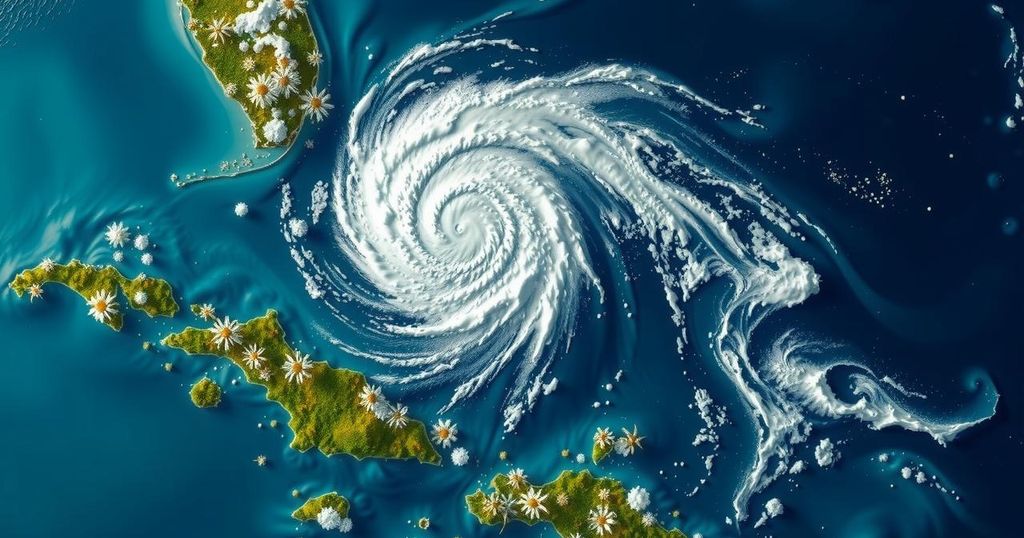Tropical Storm Oscar Dissolves After Impacting Cuba and Threatening the Bahamas
Tropical Storm Oscar has dissipated after hitting Cuba as a Category 1 hurricane, resulting in six fatalities and heavy rainfall. While its remnants approach the Bahamas, anticipation grows for potential future storm developments. Oscar is noted for being the smallest recorded hurricane, and its unexpected intensification has raised questions about forecasting accuracy amid a predicted active hurricane season.
Tropical Storm Oscar has dissipated as it approached the Bahamas following a notable landfall in Cuba, where it was classified as a Category 1 hurricane. The storm tragically claimed the lives of at least six individuals and brought significant rainfall to an island already grappling with a severe and unrelated power outage. On Tuesday afternoon, the remnants of Oscar were situated approximately 75 miles (115 kilometers) east-southeast of Long Island in the Bahamas, with maximum sustained winds reduced to 35 mph (55 kph) while moving northeast at 12 mph (19 kph), as reported by the National Hurricane Center in Miami. Forecasts indicate that the remnants of the storm may deposit up to 4 inches (10 centimeters) of rain across the southeastern Bahamas along with the Turks and Caicos Islands. Notably, Oscar is recorded as the smallest hurricane in history, with its wind field measuring only about 6 miles (10 kilometers) in diameter. This unexpected storm made landfall first on Grand Inagua Island in the Bahamas on Saturday and then in eastern Cuba late Sunday, subsequently making an unusual retreat back toward the Bahamas once more. Michael Lowry, a hurricane specialist and storm surge expert, pointed out, “It’s not often we see a colossal failure in hurricane forecasting,” reflecting on the surprise factor of the storm’s escalation to hurricane status, which had not been predicted by the forecasting models. The storm dumped as much as 15 inches (38 centimeters) of rain in parts of eastern Cuba, prompting warnings about heavy flooding and potential landslides. The fatalities were reported in Guantánamo, where residents are still dealing with the aftermath of a significant blackout that had prompted protests and stern government warnings against unrest. Having formed as the 15th named storm and the 10th hurricane of the Atlantic hurricane season, which spans from June 1 to November 30, Oscar’s impact was compounded by forecasts of another potential storm developing in the central Caribbean in approximately one week. Lowry further remarked, “One last gasp may be in store for the Atlantic as we turn the calendar to November.” The National Oceanic and Atmospheric Administration (NOAA) had previously predicted an above-average hurricane season for the Atlantic, influenced by extraordinarily warm ocean temperatures, estimating a total of 17 to 25 named storms by the season’s conclusion, with four to seven major hurricanes reaching Category 3 status or higher. Amidst these developments, Tropical Storm Kristy is currently observed in the Pacific Ocean, positioned about 470 miles (755 kilometers) west-southwest of Acapulco, Mexico, with maximum sustained winds of 60 mph (95 kph) and a trajectory westward at 16 mph (26 kph), with expectations of becoming a hurricane by Tuesday night.
Tropical Storm Oscar showcases the severity and unpredictability of the Atlantic hurricane season. It is a timely reminder that these natural phenomena can achieve unexpected intensifications, as highlighted by Oscar’s swift transition from a tropical storm to a Category 1 hurricane. The fatalities and heavy rains experienced underscore the significant risks such storms pose, particularly to islands like Cuba that are already facing critical infrastructure challenges. The event prompted discussions on forecasting efficacy and preparedness against the backdrop of a predicted above-average hurricane season, influenced by unprecedented ocean temperatures.
In summary, Tropical Storm Oscar’s unexpected escalation to hurricane strength and its subsequent impact in Cuba, resulting in fatalities and extensive rainfall, serves as a stark reminder of the dangers posed by such storms. The aftermath includes ongoing struggles over power restoration in Cuba and anticipations of future storms in the region. With forecasters projecting an active hurricane season, vigilance and preparedness remain crucial for communities at risk.
Original Source: www.ivpressonline.com




Post Comment